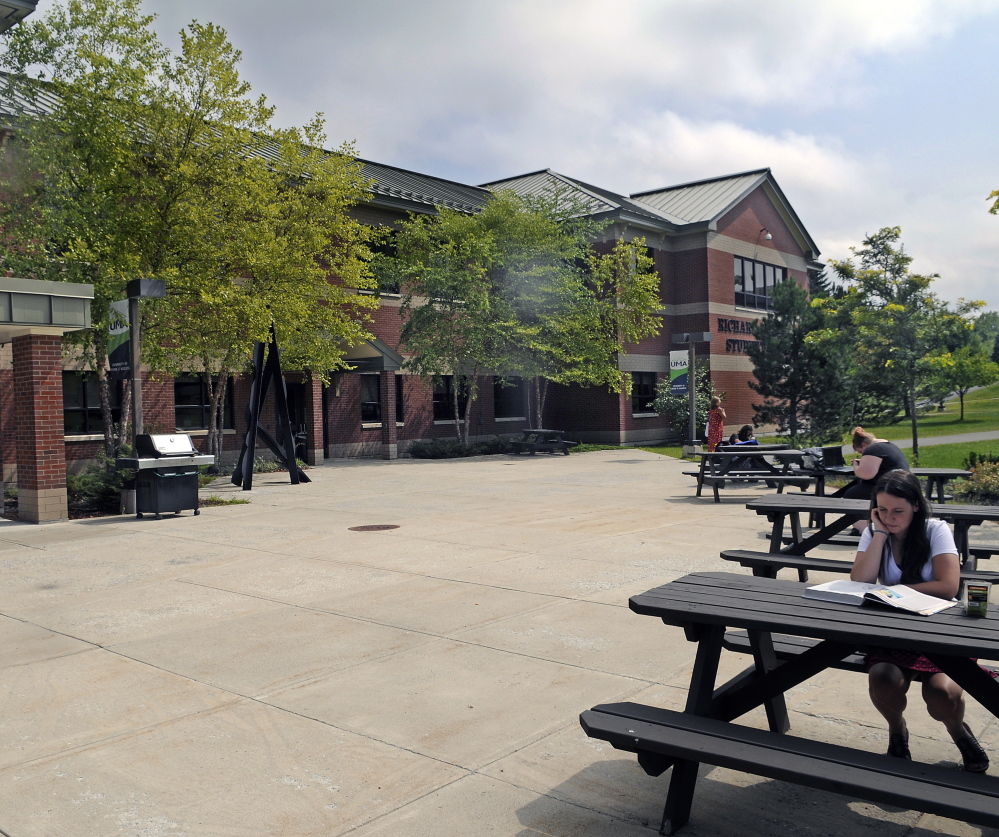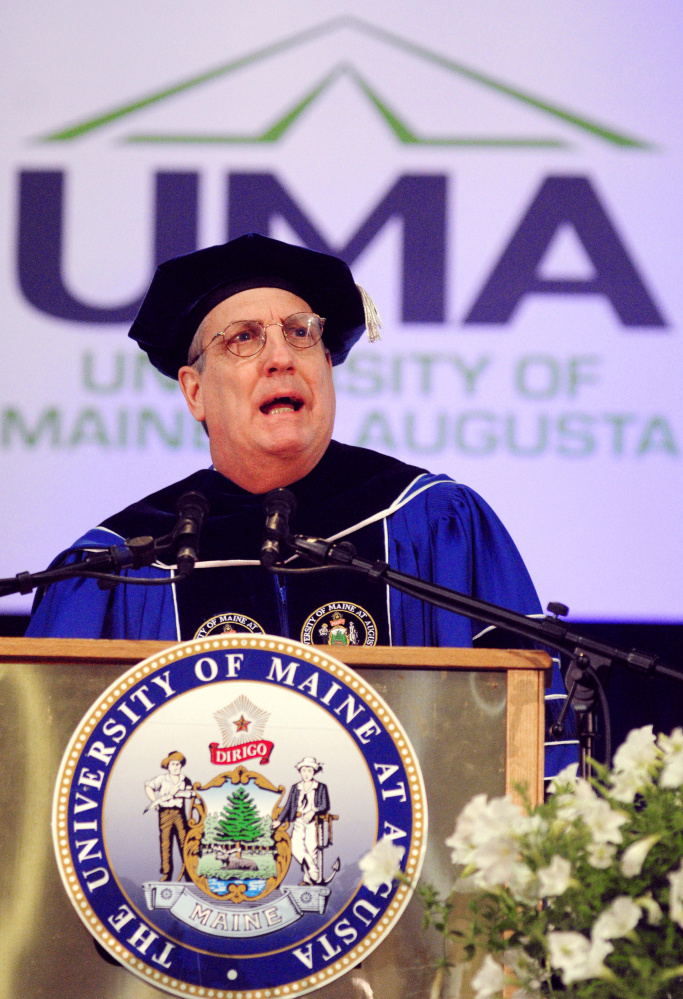AUGUSTA — As the University of Maine at Augusta launches a new search for a new leader, a local bank president familiar with the selection process said the school’s reputation for serving nontraditional students might mean the school needs a nontraditional president.
Kennebec Savings Bank President and Chief Executive Officer Andrew Silsby, a member of the UMA Board of Visitors and 2015’s presidential search committee, which brought James Conneely to the school last year, said Wednesday he was a little surprised when he learned Conneely resigned earlier this month.
“I thought he was doing a good job connecting with the community and getting out there,” Silsby said. “There must’ve been a difference in philosophy.”
Conneely’s resignation, effective June 30, came less than two years after his hiring was touted as bringing commitment and stability to the university. Now the school again is looking for a president, who will be the institution’s fifth leader since September 2014.
University of Maine System officials have declined to say much about the search for a new president since news of Conneely’s resignation broke, but spokesman Dan Demeritt said Wednesday that Chancellor James Page expects to name an interim president by the end of May. He declined to provide any further details about the search for a permanent replacement.
“Chancellor Page has visited the campus on multiple occasions and continues to engage in discussions with campus and community stakeholders,” Demeritt said via email. “UMA has a strong leadership team in place that works in close coordination and partnership with administrative, student support and academic teams across the campuses as part of the One University Initiative.”
Conneely, through a spokeswoman, declined to speak to a reporter Wednesday. He is working part time as he continues to recover from hip replacement surgery.
Silsby said the faculty and staff would welcome some consistency on campus. Allyson Handley, Glenn Cummings, Rebecca Wyke and Conneely have led the school in the last 30 months.
“I definitely think it’s a little bit of a setback, because we had started to build some momentum,” Silsby said. “(Conneely) was trying to make some changes, and I don’t know if everyone agreed with them, but that’s leadership.”
UMA is a unique campus, Silsby said, and he thinks the school needs a president who can connect to the community, understands its needs and can develop programs that respond to those needs.
He thinks that finding an internal candidate, or at least someone from Maine, would be the best choice.
“As a society, we sometimes look for someone from away to help us resolve our challenges, but you probably lose some efficiency hiring someone from away,” Silsby said. “(The ability) to hit the ground running would be an important piece.”
One potential candidate is Wyke, a former interim president currently serving the University of Maine System as vice chancellor for finance and administration. Student Government Association President Patrick Caskin said there’s a feeling among the majority of his organization that Wyke would be the best person for the job, though it’s unclear whether she’s interested or being considered.
“During her short time as interim president, (Wyke) showed a sincere interest in the students and tackled several student issues,” Caskin said earlier this month.
Count Silsby as another Wyke supporter. He said she did a “fabulous job,” but added that Cummings, who is now president of the University of Southern Maine, did a “great job as interim president as well.”
UMA has responded well to the community’s needs, Silsby said, but in order to take the next step as an institution, he thinks the school needs on-campus housing.
“We need that to get to the next level, so we need a president who can advocate at a systemwide level,” Silsby said. “We’re reaching a certain point where some programs can get to the next step if we had housing.”
In May 2015, the university announced that it was working with a Portland developer to build and operate a 70-bed dormitory on campus, but those plans don’t appear to have progressed beyond the preliminary stages.
Augusta City Manager William Bridgeo said UMA has a number of dynamic programs, including architecture and aviation, that exemplify the school’s value and growth potential. He said the school’s presence adds much to the city’s cultural richness.
“In my mind, UMA is a central component to Augusta’s community identity,” Bridgeo said. “It’s a valuable resource for all who take advantage of its educational offerings.”
Bridgeo said the city always has had a good relationship with the school, and he credits Handley and Conneely for being champions of nurturing that relationship. While he was saddened to learn that Conneely is leaving in June, he is confident the school will have another strong leader soon.
“City government is committed to doing whatever we can to help ensure UMA’s continued success,” he said.
Silsby has seen some of UMA’s successes firsthand at Kennebec Savings Bank. He said UMA has played a vital role in helping some of the bank’s employees get their degrees and advance in their careers. It’s the reason he thinks the school is so important to the area.
“This is an incredibly vital resource to central Maine, and we need to make sure the system and state understands the vital and important role UMA plays,” he said. “I don’t think the school has done a good job of that, but there’s a lot of good things going on.”
Conneely came to UMA after having been president of Notre Dame of Maryland University in Baltimore, associate provost and vice president of student affairs at Eastern Kentucky University and assistant vice chancellor of student affairs at the University of Arkansas.
His 31-year career in higher education began at the University of Northern Iowa in Cedar Falls. From there, he spent time at Villanova University, outside Philadelphia; and Emory University, in Atlanta. He moved to Fayetteville in 1993, where he was Arkansas’ director of residence life and dining services before taking his position in the student affairs department.
When he began the job in January 2016, he signed a three-year contract that ran through June 30, 2018, and paid him $192,000 annually. He will not be paid for the remaining year of his contract, according to Demeritt.
Jason Pafundi — 621-5663
Twitter: @jasonpafundiKJ
Send questions/comments to the editors.





Success. Please wait for the page to reload. If the page does not reload within 5 seconds, please refresh the page.
Enter your email and password to access comments.
Hi, to comment on stories you must . This profile is in addition to your subscription and website login.
Already have a commenting profile? .
Invalid username/password.
Please check your email to confirm and complete your registration.
Only subscribers are eligible to post comments. Please subscribe or login first for digital access. Here’s why.
Use the form below to reset your password. When you've submitted your account email, we will send an email with a reset code.